-
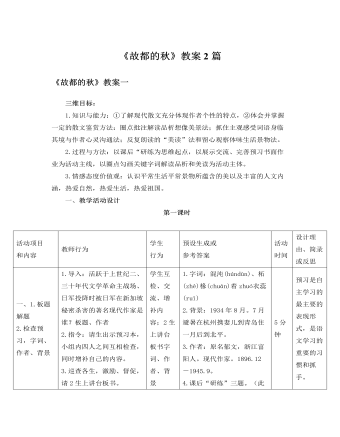
人教版高中语文必修2《故都的秋》教案2篇
三、具体研习1、文章的哪些段落描写了故都的秋?郁达夫先生既然这么喜欢故都的秋,那么他选取了哪些画面来写故都的秋?(学生阅读圈点,教师引导学生找关键词、关键句。)明确:从3--11自然段。主要是5幅画面,第3段庭院静观(破屋秋色),第4段槐树落蕊(街头落蕊),第5段秋蝉残鸣,第6—10段闲话秋凉,第11段清秋佳果。2、故都的秋有什么特点?明确:清、静、悲凉。2、作者在对这些景具体的描绘中,是如何体现故都秋“清、静、悲凉”的特点的呢?(下面先请同学来诵读课文3——11段落,其他同学要眼耳手脑并用,一是圈出文中体现秋天色彩的词语,二是标出传递声响的物名。我们将从“秋色”和“秋声”两个角度来品味一下故都的“秋味”。)
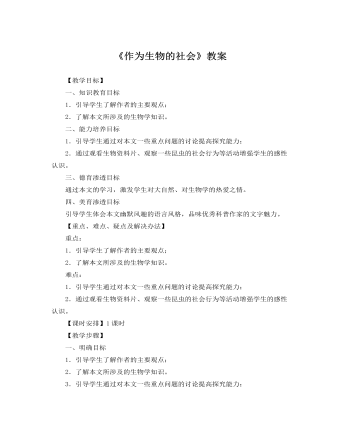
人教版高中语文必修5《作为生物的社会》教案
二、整体感知1.导入新课同学们《细胞生命的礼赞》是一个医学家、生物学家关于生命、人生、社会乃至宇宙的思考。思想博大而深邃,信息庞杂而新奇,批评文明,嘲弄愚见,开阔眼界、激发思索。而其文笔又少见的优美、清新、幽默、含蓄,无愧当今科学散文中的大家手笔。无怪乎自1974年出版后,立即引起美国读书界和评论界的巨大反响和热烈欢呼,获得当年美国国家图书奖,此后18年来由好几家出版社印了二十多版,至今畅行不衰!年过花甲的刘易斯·托马斯的名字因这一本小书而家喻户晓,有口皆碑,以至于在他接连抛出后两本书时,书商都不用再作广告,只喊声"《细胞生命的礼赞》一书作者刘易斯·托马斯的新著"就够了。今天我们就来学习选自这部书的精彩章节《作为生物的社会》(板书课题)。
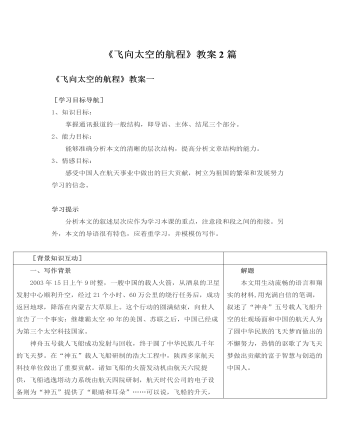
人教版高中语文必修1《飞向太空的航程》教案2篇
第7~10段,我们取得了初步的成就。先写毛泽东主席的号召,激励无数的航天人去实现千年梦想;接着写我们的计划,上天毕竟是一件天大的事情,不是谁一句话就能吹上去的,需要有周密的计划,这计划的第一步是研制火箭,成功了,而从毛主席发出号召开始到火箭成功发射才用了1年零9个月;又用了不到10年的时间中国的第一颗人造卫星又上了天,“宣告中国进入了航天时代”。由号召,到计划,到成功,一步一步写来,紧张的任务,紧凑的文章,娓娓道来,条理清晰。第11~13段,人造卫星上天了,下一步就是载人飞天,圆千年梦想。我们也做了大量的准备工作,一是航天材料、食品等的准备,一是航天员的准备,已经挑选了19位优秀的飞行员,他们是航天员的预备军。看来实现中国人的航天梦已为时不远了。可是在科学上是没有坦途的,由于多方面的原因,计划搁浅了,我们的飞天梦想“只能尘封在一张张构思草图中”,这是多么遗憾的事啊!
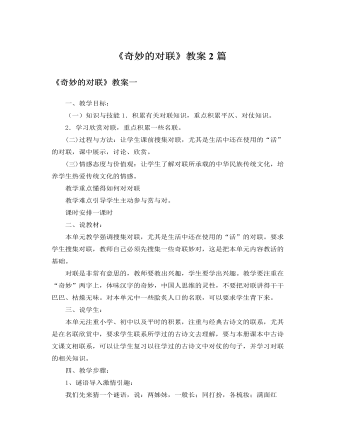
人教版高中语文必修1《奇妙的对联》教案2篇
3、介绍对联的历史引出本课的重点。人类历史上的第一副对联是“新年纳余庆,嘉节号长春”。出现在五代十国时期(公元964年),距离现在已经有1044年了。有着一千多年历史的对联有什么基本的特点呢?这是我们这节课学习的重点。请在座的各位当回医生,给下面这幅对联号号脉,看它对仗是否工整?上联:冬去春来千条杨柳迎风绿下联:冰消雪化梅花万朵扑鼻有什么问题,怎么改?刚才这几位同学指出了这幅对联的两个问题,也提出了两条修改意见。第一是下联少了一个字,最好是添加一个“香”字;第二是下联的“梅花万朵”与上联的“千条杨柳”是数量词对名词,名词对数量词,对仗不工整,要调整为“万朵梅花”。这样,数量词“万朵”对“千条”,名词“梅花”对“杨柳”。大家还有没有不同的看法。这样我们就可以得出对联的两个特点特点:第一个特点是上下联字数要相等(板书)。就是上联有几个字,下联也要有几个字。大家记下来,对联基本要求一,“上下联字数相等”。这个要求是很严格的,一般来说,违反这个规则就不成对联了。
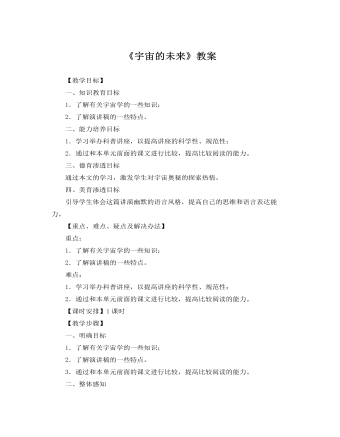
人教版高中语文必修5《宇宙的未来》教案
(2)怎样理解本文的一些相关论述?【明确】这是一篇科学讲演,涉及较为复杂的背景知识。这些知识和讲演的主题是密切相关的,如果不作必要的交待,讲演的内容就会显得抽象和单薄。如,谈到天气预报、大脑工作原理都具有混沌性质,来反衬宇宙在大尺度上是"平滑而非混沌"的;如,谈到恒星的死亡(归宿)引出黑洞,为宇宙中暗物质的存在寻找理论支持;如,谈到现存宇宙对初始密度的极度敏感,引出了"人择原理"等等。这些相关的论述,或从对立面凸显观点,或从纵深面强化观点,使论证丰富多彩。(3)这篇讲演在语言上具有怎样的特点?【明确】讲演是面对面的交流,这种交流又是单向度的,如果不注意讲演的语言艺术,就达不到最佳的表达效果。这篇讲演,除了推理严谨外,语言幽默也是其突出的特点。幽默的语言创造出一种轻松愉快的气氛,更具有亲和力,使所阐发的事理更容易为听众接受。

人教版高中地理必修3区域工业化与城市化教案
知识和技能 1、 了解区域工业化和城市化之间的关系,以及它们对区域社会经济发展所起的作用 。2、分析导致珠江三角洲工业化和城市化快速推进的诸多思想束缚,并通过比较,认识到对外开放政策是其中的关键因素。3、 比较珠江三角 洲的 区工业化进程的两个主要阶段,归纳出不同时期的主要发展特点,并能够结合具体案例分析工业化进程对城市化的巨大推动。 4、分析珠江三角洲地区工业化和城市化进程中的问题,并尝试评价目前的一些调整措施和发展方向。5、通过分析我国珠江三角 洲地区工 业化、城市化的发展阶段、问题与对策,了解区域工业化和城市化的推进动力和发展规律。过程与方法 利用扮演不同的社会角色来谈对珠江三角洲地区未来经济和城镇发展的设想和建议,反馈学生知识、能力、价值观发展情况和效果, 培养学生对所学所得的运用能力,并为学生的创新精神的发 展营造有利氛围。情感、态度与价值观1、通过鼓励学生主动获 取资料的做法,关注学生实践能力、综合思维能力及终身学习能力的训练。
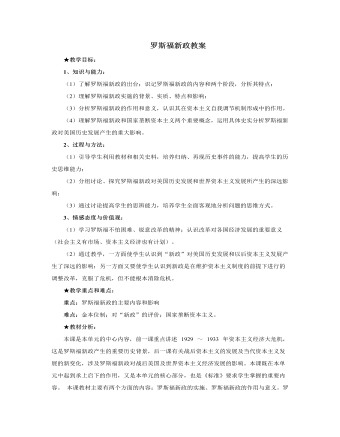
人教版高中历史必修2罗斯福新政教案
【教学参考】对“新政”作用的评价史学界对“新政”作用的评价是仁者见仁、智者见智,但基本上有三种观点,即“功大于过论”、“过大于功论”和“功过参半论”。持“功大于过论”者认为“新政”在美国历史上基本上是一种进步现象,首先,“新政”挽救了危机,使美国人民摆脱了危机的困苦局面;其次,在缺少足够的宏观经济政策知识的时代,罗斯福所做的努力确实是开创性的;再次,罗斯福“新政”开启了美国以后历届政府实施国家干预政策的大门,成为缓解自由主义经济制度之弊病的一剂良方,并在实质上加强了美国联邦政府的权威;最后,在30年代资本主义世界经济危机的背景下,同日本、德国为转嫁危机而发动战争的策略相比,“新政”无疑代表了一种进步、民主的解救危机方式。持“过大于功论”者认为“新政”未能使美国走出萧条、步入繁荣。

人教版高中语文必修3《高老头》教案
4、问题讨论(1)巴尔扎克小说在法国文学史上的地位?在法国文学史的地位:随着巴尔扎克在法国文坛上的如日中天,他渐渐地被他的时代的作家所认识。戈蒂耶第一个站出来热情地赞扬巴尔扎克的天才。此后乔治·桑、波德莱尔、福楼拜、左拉对他赞誉有加。雨果甚至在巴尔扎克的葬礼上说:“在最伟大的人物中间,巴尔扎克属于头等的一个,在最优秀的人物中间,巴尔扎克是出类拔萃的一个。他的才智是惊人的,不同凡响的成就,不是眼下说的尽的……”人道主义斗士法朗士对文体非常苛求,他深请地说:“他是他那个时代的社会的洞察入微的历史家。他比任何人都善于使我们更好地了解从旧制度想新制度的过度。”特别强调:“从塑造形象和深度来说,没有人能比得上巴尔扎克。”后来的作家莫洛业说:“巴尔扎克不仅仅是十九世纪的优秀作家,他堪称最伟大的小说家,这在今天几乎是一致的看法。”

人教版高中语文必修3《登高》教案2篇
【设计思想】诗歌教学的关键是感受诗景,体味诗情,领悟诗意,在此基础上孕育理解能力、鉴赏能力和审美情感。诗景、诗情、诗意均由文字来承载,把握文字组合的张力,是读诗赏诗的抓手。杜甫的诗歌素以炼字精深、涵盖深远著称,以《登高》而言,往往淡淡一字,平平一语,便笼大千于方寸,缩古今于一瞬。故细读文本,咀嚼字句,便是赏景、悟情、会意的基本路径。其次,不朽名作的特点是寄寓深广,古今评价甚多,见仁见智,不一而足。这正是培养学生问题意识、探究意识的极好凭借。第三,诗为语言之精华,是诗人心里涌出的情感之流。诵读乃赏诗之要着,精心感悟之时,设身处地,心惟口诵,是理解诗意的关键一步。基于是,笔者作如下同课异构,殊途同归。【教学目标】1.理解本诗所绘之景、所抒之情及绘景、抒情之法。2.学会用意象叠加法、字句推敲法、诵读体验法等欣赏诗歌。3.感受杜甫心系苍生、情寄邦国、忧国忧民、兼济天下的博大情怀。
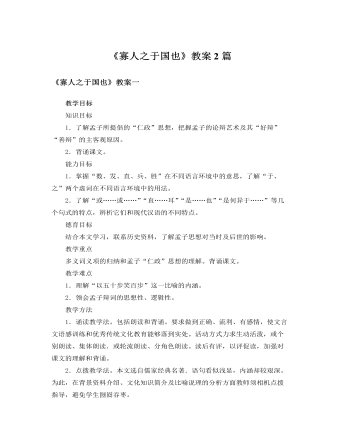
人教版高中语文必修3《寡人之于国也》教案2篇
一、引入:教师列举以下言论,让学生辨出哪些是孟子的,哪些不是。学生不知道的,由教师说出。学生不理解的,教师作简要解说。1.天将降大任于是人也,必先苦其心志,劳其筋骨,饿其体肤,空乏其身,行拂乱其所为。所以动心忍性,曾益其所不能。(孟子)2.域民不以封疆之界,固国不以山溪之险,威天下不以兵革之利。得道者多助,失道者寡助。(孟子)3.鱼,亦我所欲也,熊掌,亦我所欲也,二者不可得兼,舍鱼而取熊掌者也。生,亦我所欲也,义,亦我所欲也,二者不可得兼,舍生而取义者也。(孟子)4.富贵不能淫,贫贱不能移,威武不能屈。(孟子)5.非礼勿视,非礼勿听,非礼勿言,非礼勿动。(孔子)6.无恻隐之心非人也,无羞恶之心非人也,无辞让之心非人也,无是非之心非人也。(孟子)7.庖有肥肉,厩有肥马,民有饥色,野有饿殍。(孟子)8.人性之善也,犹水之就下也;人无有不善,水无有不下。(孟子)9.民为贵,社稷次之,君为轻。(孟子)10.君子坦荡荡,小人常戚戚。(孔子)

人教版高中语文必修3《老人与海》教案2篇
(一)导入[以视频欣赏导入]同学们,刚才欣赏的是大家熟悉、喜欢的电视剧《亮剑》中的精彩片段——李云龙论述什么是“亮剑”精神?同学们听后觉得好不好?牛不牛?“亮剑”精神简单理解就是敢于与强大的敌人(对手)做斗争,无论对手多么强大,都要满腔勇气和信心,永不放弃、永不言败,要敢于亮剑……今天我们一起来学习世界100部著名文学作品之一、美国里程碑式30部文学作品之一的世界名著——海明威的《老人与海》,看看主人公桑提亚哥“硬汉”性格和李云龙“亮剑”精神有么相似的地方。(请同学们翻到课文,课件显示课题《老人与海》)(二)走进作者:请同学们自己谈收集到的有关海明威的资料,然后教师梳理出下列核心内容识记:(课件显示)海明威(1899~1961),美国现代作家,20世纪美国文学史上最耀眼的名字之一。早期作品表现了第一次世界大战青年一代的彷徨情绪,以“迷惘的一代”的代表著称。20世纪末回到美国,写了不小以拳击家、渔民、猎人等为主人公的短篇小说,创造了“硬汉子”性格。
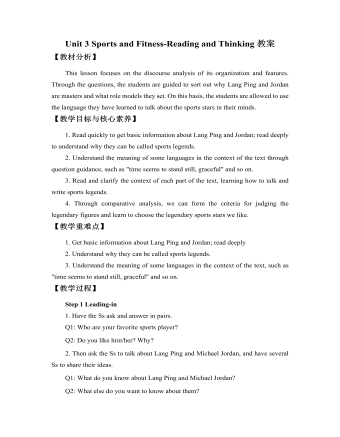
新人教版高中英语必修1Unit 3 Sports and Fitness-Reading and Thinking教案
2. Sort out detailed information about Michael Jordan.(1) Understand the transitional sentence.Q: Which part is about Michael Jordan as a master? Which part is about the example he set?(2) Have the Ss Focus on why Michael Jordan is a master and what good examples Michael Jordan set when they’re reading. And think about these questions as below:Q1: How does the author describe his impressive skills?Q2: How do you understand “time seemed to stand still”?Q3: What does “graceful” mean?Q4. Which sentence do you think best describes his mental strength?Q5. Which words is important in the sentence in describing his mental strength? Why?Q6: How do you understand “unique”?Q7: What can we learn from Michael Jordan?Step 5 Discussing and recommendingRecommend their own living legends of sports.Work in groups to choose your own living legend of sports and give the reasons of your choice. Step 6 HomeworkReview the stories of Lang Ping and Michael Jordan, and try to retell them.

新人教版高中英语必修1Unit 3 Sports and Fitness-Reading for Writing教案
Then have them write a short paragraph to describe and explain their changes. After that, get the Ss to exchange their drafts with their partners and use the checklist to give feedback on their drafts, and finally revise it.Step 5 Summary of how to write a wellness book1.健康书的审题步骤:第一步:明确要求该写作属于经验分享,故要用第一人称来写;时态以一股现在时为主。第二步:确定段落该类文章可以从以下三个方面人手:Para.1首先表明写作的目的Para.2自己的做法及心得体会Para.3表示期望及感谢第三步:提炼要点2.健康书常见句式:1) It is an honor for me to share my favorite sport with you,2) It makes me feel relaxed playing with my friends.3) It makes me rid myself of stress while playing with my friends.4) Moreover, it provides me a valuable chance to communicate with others.5) I we eat too little or too much, or if we choose the wrong food, we may become sick.6) We can do something to change the poor situation.Step 6Homework假如你的老师让你在班级Wellness Bok上分享自己的亲身经历及心得,请根据以下要点写一篇80字左右的文章1. 你喜欢的运动是什么?2. 你最喜欢的原因是什么?3. 你参加锻炼的体会。

新人教版高中英语必修2Unit 3 The Internet-Discovering Useful Structure教案二
This teaching period mainly deals with grammar “The Present Perfect Passive Voice.” To begin with, teachers should lead students to revise what they have learned about the Present Perfect Passive Voice. And then, teachers move on to stress more special cases concerning this grammar。This period carries considerable significance to the cultivation of students’ writing competence and lays a solid foundation for the basic appreciation of language beauty. The teacher is expected to enable students to master this period thoroughly and consolidate the knowledge by doing some exercises. 1. Guide students to review the basic usages of the Present Perfect Passive Voice2. Lead students to learn to use some special cases concerning the Present Perfect Passive Voice flexibly.2. Enable students to use the basic phrases structures flexibly.3. Strengthen students’ great interest in grammar learning.1. Help students to appreciate the function of the Present Perfect Passive Voice in a sentence2. Instruct students to write essays using the proper the Present Perfect Passive Voice.观察下列句子特点,总结共同点。1.(教材P28)Much has been written about the wonders of the World Wide Web.2.(教材P28)But the Internet has done much more for people than simply make life more convenient.3.(教材P28)Many people have been helped by the club.4.(教材P28)She no longer feels lonely, and her company has become quite successful.5.(教材P32)Today I thought I’d blog about a question that has been asked many times—how do you stay safe online and avoid bad experiences on the Internet?

新人教版高中英语必修2Unit 3 The Internet-Discovering Useful Structure教案一
This unit is about the Internet, which has a great influence to our humans and our lives. During the Listening & Speaking & Talking and Reading and Thinking section, the influence in examples has been shown. Thus, use the Present Perfect Tense is appropriate. However, in order to show the justice or weaken the doer of the behavior/action, it’s better to use the Present Perfect Passive Voice than the Present Perfect Tense. Besides, having learned to use the Present Perfect Passive Voice, students can beautify their language in their writing. 1. Learn the structure of the Present Perfect Passive Voice and its functions. 2. Learn to change the sentences with the Present Perfect Passive Voice into the sentences with the Present Perfect Passive Voice. 3. Learn to write sentences with the Present Perfect Passive Voice flexibly according to the context. 1. Learn the structure of the Present Perfect Passive Voice and its functions. 2. Learn to change the sentences with the Present Perfect Passive Voice into the sentences with the Present Perfect Passive Voice. 3. Learn to write sentences with the Present Perfect Passive Voice flexibly according to the context. Step 1 Observe the following sentences, then change the sentences into passive voice.He has been selected to take part in the sports meeting.(肯定句)他已被挑选出来参加运动会。The ink has not been removed from his overcoat.(否定句)墨迹还没有从他外套上去掉。

新人教版高中英语必修2Unit 3 The Internet-Listening &Speaking&Talking教案二
From the pictures in the text and the title--- choose the best app, we can know that this part is about how to save money by using apps.Step 2 While-listening1. Laura and Xiao Bo are talking about apps. Listen to their conversation and find out what apps they want.Xiao Bo is looking for a(n) exercise app to help him get in shape.Laura would like an app for getting rich and another that will make her grades better.2. Listen again. Are the sentences true T or false F?1). Both of Xiao Bo's apps keep track of the steps he takes._____2). Xiao Bo's second app can help him make a fitness plan._____3). Laura needs an app that will help her get discounts.______4). Laura needs an app that will add money to her bank account._______F T F T3. Listen once more and tick the sentence you hear. Underline the words used to express predictions, guesses, and beliefs.Predictions, Guesses, and Beliefs________It might help me walk more.________My guess is that it wouldn't work.________I imagine this app would help me get fit faster________I suppose that would be good.________I guess you could save a little with this app.________I suppose there would be some problems, too.________I believe this app could help me get thinner.

新人教版高中英语必修2Unit 3 The Internet-Listening &Speaking&Talking教案一
Listening and Speaking introduces the topic of “ask about online habits”. Many middle school students have been surfing the Internet for many years, but what they do with the Internet and how much time they spend every day may not be very clear to themselves, nor to other students. This section allows students to investigate their peers' Internet use, which is conducive to their mutual understanding and understanding of the Internet. It can also help them reflect on their own online behavior, learn from other people's good online habits, and get rid of their bad online behavior.The listening text of this section is an investigation interview. The investigators interview specific groups with the same questions to obtain information, so as to understand their views, practices or attitudes on this issue. There are two specific questions: “how much time do you spend online every day? What do you usually do online?”. The answers of the three respondents provide rich and different information, and achieve the purpose of the investigators. The oral discourse structure of survey interviews generally includes greeting and explaining the purpose of the interview, presenting the interview questions and the respondents' answers. Listening and Talking introduces the theme of “choosing the right application ". Listening text is a conversation between Laura and Xiao Bo. In this part of listening, “oink”; “piggy bank” may cause the students' hearing comprehension limitation. Oink refers to sound word and pig's sound. So, add some oink to my piggy bank is often used to describe "making a little money".1. Guide students to understand the content of listening texts in terms of listening for definitions.2. Cultivate students' ability to define words and understand an investigation interview.

新人教版高中英语必修2Unit 3 The Internet-Reading and Thinking教案二
Q5:What's Jan's next goal?Her next goal is to start a charity website to raise money for children in poor countries.Q6:What can we learn from her experiences?We learn that when we go through tough times, we can find help and support from other people online. We learn that we can feel less lonelyStep 5: While reading---rethinkingQ1: What is Jan’s attitude to the Internet ?Thankful/Grateful, because it has changed her and her life.Q2: What writing skills is used in the article ?Examples(Jan’s example, the 59-year-old man’s and the 61-year-old woman’s example)Q3: Can you get the main idea of the article ?The Internet has changed Jan’s life/Jan’s life has been changed by the Internet.Step 6 Post reading---Retell the storyMuch has been written about the wonders of the World Wide Web. There are countless articles (1)telling(tell) us how the Internet has made our lives more convenient. But the Internet has done a lot (2)more(much) for people than simply make life more convenient. People’s lives (3) have been changed(change) by online communities and social networks so far. Take Jan for example, who developed a serious illness that made her (4)stuck(stick) at home with only her computer to keep (5)her(she) company. She joined an online group (6)where she could share problems, support and advice with others. She considered the ability to remove the distance between people as one of the greatest (7)benefits(benefit). She was so inspired (8)that she started an IT club in which many people have been helped. She has started to learn more about how to use the Internet to make society better. Her next goal is to start a charity website to raise money (9)for children in poor countries. Jan’s life has been (10)greatly(great) improved by the Internet.

新人教版高中英语必修2Unit 3 The Internet-Reading and Thinking教案一
Paragraph 3. Jan decided to start an IT club to teach old people how to use computers and the Internet. Paragraph 4. Jan has started taking online classes to learn more about how to use the Internet to make society better. Paragraph 5. Jan’s life has been greatly improved by the Internet. Step 5: Critical thinking:(1)How do you arrange your time spent on study and the Internet? Is it reasonable? I usually surf the Internet using my mobile phone for only an hour after class, and it is reasonable for me.(2)What are your online activities? Are they safe? I chat with my friends, read news and play games. I never give away my private information so I think they are safe.Step 4: summary Much has been written about the wonders of the World Wide Web. There are countless articles (1)______(tell) us how the Internet has made our lives more convenient. But the Internet has done a lot (2)_____(much) for people than simply make life more convenient. People’s lives (3) _________________(change) by online communities and social networks so far. Take Jan for example, who developed a serious illness that made her (4)_____(stick) at home with only her computer to keep (5)___(she) company. She joined an online group (6)______ she could share problems, support and advice with others. She considered the ability to remove the distance between people as one of the greatest (7)_______(benefit). She was so inspired (8)____ she started an IT club in which many people have been helped. She has started to learn more about how to use the Internet to make society better. Her next goal is to start a charity website to raise money (9)___ children in poor countries. Jan’s life has been (10)______(great) improved by the Internet. Step 5 Homework:Review what we have learned and find out the key language points in the text.

新人教版高中英语必修2Unit 3 The Internet-Reading for Writing教案二
8. However, the more polite you are, the less likely it is you will be attacked. 然而, 你越有礼貌, 你被攻击的可能性就越小。 Step 8 Writing---the articleHow to stay safe in the online chat roomToday I thought I’d blog about a question that has been asked many times--- how do you stay safe online and avoid bad experiences in the online chat room ? I’m not an expert, but many years as a blogger have taught me a thing or two.First of all, there’s the golden rule of the Internet: keep out of what makes you uneasy. Don’t post comments or click on anything. Second, protect your privacy. Don’t give out too much private information like your address, phone numbers, the ID numbers, etc. Third, be polite. If you are polite to others on the Internet, you won’t be attacked in normal situation. Finally, don’t believe in others easily and never meet someone you met online alone. It is very dangerous.Have you had any bad experiences online, or do you have some good advice for staying safe? Post your comments below!Step 9 Pair workExchange drafts with a partner. Use this checklist to help your partner revise his/her draft.1. Does the writer tell the reader what he/she know about the topic ?2. Are the tips and suggestions well organised ?3. Has the writer defined the new words ?4. Does the author include examples, comparison, or explanations ?5. Does the writer end by asking readers to leave comments and/or suggestions ?6. Can you find any grammar or spelling mistakes.Step 6 HomeworkPut up your revised draft in the classroom or read it to your class.